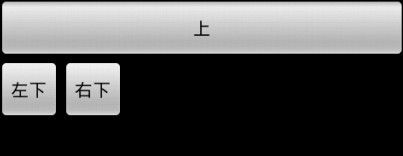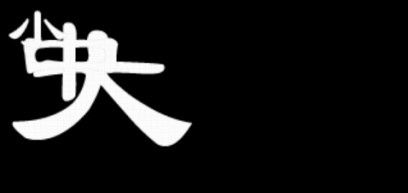android布局与源码
横向线性布局加relativeLayout

-----------------------------------------------------------------------
LinearLayout ,

---------------------------------------------------------------
Table布局

------------------------------------------------------
相对布局

----------------------------------------------
Frame布局

----------------------------------
对于每种布局,都有专属的xml语句,有些xml就、语句是在其他地方运行不出来的
FrameLayout
如果要在FrameLayout里面调整控件的位置,
在他下属的控件或者是layout里面 android:layout_gravity="bottom"(也可以是top~~~)是最好用的
注意:android:layout_gravity="left"这个属性似乎在哪里都可以用,就是本布局与上一布局的关系。
RelativeLayout:
下属控件用:android:layout_centerHorizontal="true" 居中
android:layout_alignParentLeft
android:layout_toLeftOf
android:layout_alignLeft
LinearLayout
<LinearLayout android:orientation="vertical"
android:gravity="center" ----这是让他下面的组件居中
android:layout_height="wrap_content" android:layout_width="fill_parent"
android:layout_gravity="bottom" android:background="#80000000">

public void onCreate(Bundle savedInstanceState) {
super.onCreate(savedInstanceState);
LinearLayout layoutMain = new LinearLayout(this);
layoutMain.setOrientation(LinearLayout.HORIZONTAL);
setContentView(layoutMain);
LayoutInflater inflate = (LayoutInflater) getSystemService(Context.LAYOUT_INFLATER_SERVICE);//xml加载器
RelativeLayout layoutLeft = (RelativeLayout) inflate.inflate(
R.layout.left, null);
RelativeLayout layoutRight = (RelativeLayout) inflate.inflate(
R.layout.right, null);
RelativeLayout.LayoutParams relParam = new RelativeLayout.LayoutParams(
RelativeLayout.LayoutParams.WRAP_CONTENT,
RelativeLayout.LayoutParams.WRAP_CONTENT);
layoutMain.addView(layoutLeft, 100, 100);//先加入第一个相对布局的xml,并规定宽度和高度
layoutMain.addView(layoutRight, relParam);//剩下的空间由这个相对布局xml填充
}
-----------------------------------------------------------------------
LinearLayout ,

<Button
android:layout_width="fill_parent"
android:layout_height="fill_parent"
android:text="上"
/>
<LinearLayout xmlns:android="http://schemas.android.com/apk/res/android"
android:orientation="horizontal"
android:layout_width="wrap_content"
android:layout_height="wrap_content"
>
<Button
android:layout_width="wrap_content"
android:layout_height="wrap_content"
android:text="左下"
/>
<Button
android:layout_width="wrap_content"
android:layout_height="wrap_content"
android:text="右下"
/>
</LinearLayout>
---------------------------------------------------------------
Table布局

<TableLayout xmlns:android="http://schemas.android.com/apk/res/android"
android:layout_width="fill_parent"
android:layout_height="fill_parent"
>
<TextView
android:layout_width="fill_parent"
android:layout_height="wrap_content"
android:gravity="center"
android:text="表头"
/>
<TableRow
android:gravity="center"
>
<TextView
android:layout_width="wrap_content"
android:layout_height="wrap_content"
android:text="第0列"
--android:layout_marginLeft="10dip"
>
</TextView>
<TextView
android:layout_width="wrap_content"
android:layout_height="wrap_content"
android:text="第1列"
>
</TextView>
</TableRow>
<TableRow
android:gravity="center"
>
<Button
android:layout_width="wrap_content"
android:layout_height="wrap_content"
android:text="按钮1"
/>
<Button
android:layout_width="wrap_content"
android:layout_height="wrap_content"
android:text="按钮2"
/>
</TableRow>
</TableLayout>
------------------------------------------------------
相对布局

<RelativeLayout xmlns:android="http://schemas.android.com/apk/res/android"
android:layout_width="fill_parent"
android:layout_height="fill_parent"
>
<Button
android:id="@+id/button1"
android:layout_width="wrap_content"
android:layout_height="wrap_content"
android:text="中间的按钮,很长很长很长"
android:layout_centerInParent="true"
>
</Button>
<Button
android:id="@+id/button2"
android:layout_width="wrap_content"
android:layout_height="wrap_content"
android:text="上面的按钮"
android:layout_above="@id/button1"
android:layout_alignLeft="@id/button1"
>
</Button>
<Button
android:id="@+id/button3"
android:layout_width="wrap_content"
android:layout_height="wrap_content"
android:text="下面的按钮"
android:layout_below="@id/button1"
android:layout_alignRight="@id/button1"
--android:layout_alignParentRight="true" 这个也常用
>
</Button>
</RelativeLayout>
----------------------------------------------
Frame布局

<FrameLayout xmlns:android="http://schemas.android.com/apk/res/android"
android:layout_width="fill_parent"
android:layout_height="fill_parent"
>
<ImageView
android:layout_width="wrap_content"
android:layout_height="wrap_content"
android:src="@drawable/big"
>
</ImageView>
<ImageView
android:layout_width="wrap_content"
android:layout_height="wrap_content"
android:src="@drawable/center"
>
</ImageView>
<ImageView
android:layout_width="wrap_content"
android:layout_height="wrap_content"
android:src="@drawable/small"
>
</ImageView>
</FrameLayout>
----------------------------------
对于每种布局,都有专属的xml语句,有些xml就、语句是在其他地方运行不出来的
FrameLayout
如果要在FrameLayout里面调整控件的位置,
在他下属的控件或者是layout里面 android:layout_gravity="bottom"(也可以是top~~~)是最好用的
注意:android:layout_gravity="left"这个属性似乎在哪里都可以用,就是本布局与上一布局的关系。
RelativeLayout:
下属控件用:android:layout_centerHorizontal="true" 居中
android:layout_alignParentLeft
android:layout_toLeftOf
android:layout_alignLeft
LinearLayout
<LinearLayout android:orientation="vertical"
android:gravity="center" ----这是让他下面的组件居中
android:layout_height="wrap_content" android:layout_width="fill_parent"
android:layout_gravity="bottom" android:background="#80000000">